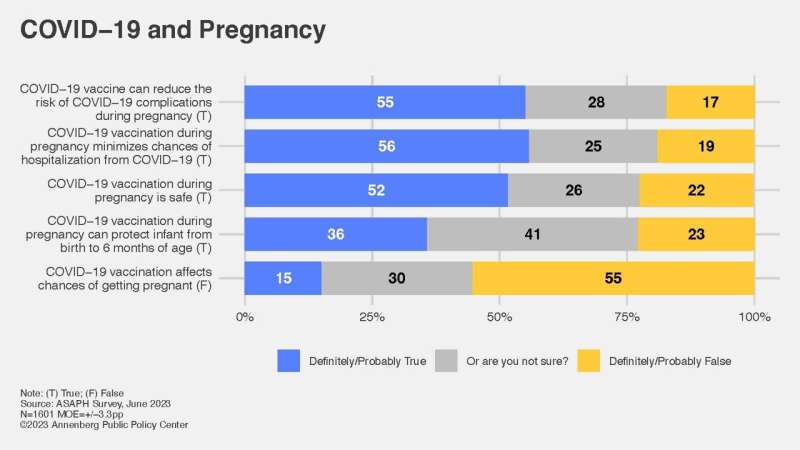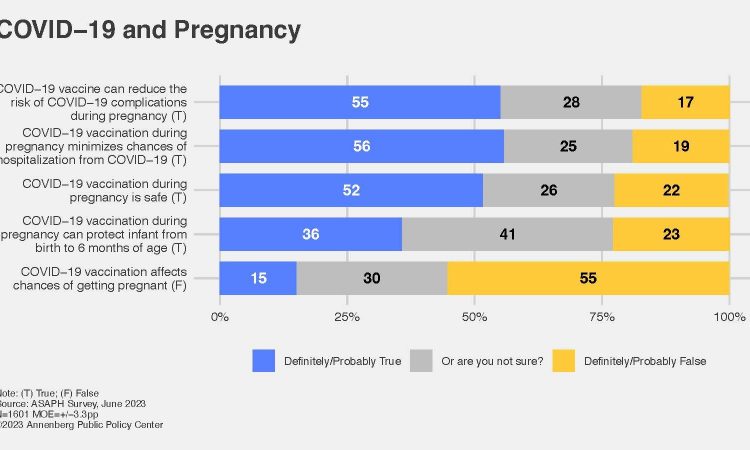
- Just over 1 in 4 people (27%) know that the CDC recommends that pregnant individuals get a Tdap vaccine against whooping cough.
- Just over half of those surveyed know that getting vaccinated against COVID-19 during pregnancy is safe (52%) and that getting vaccinated against COVID-19 can reduce the risk of complications from the disease (55%) that can affect a pregnancy.
- Only a quarter of those surveyed (26%) know that a pregnant person who gets the flu is at higher risk of delivering the baby early.
- Nearly 3 in 4 people (73%) know that having untreated high blood pressure increases the likelihood that a pregnant person will have a stroke.
APPC’s Annenberg Science and Public Health Knowledge survey
Vaccinations and pregnancy
- 87% know that the CDC does not recommend the chickenpox vaccine
- 85% know that the CDC does not recommend a measles shot
- But 73% incorrectly said the CDC does not recommend a vaccine for whooping cough known as Tdap during pregnancy—in fact, the CDC does recommend the whooping cough vaccine during pregnancy, as 27% know.
The flu and pregnancy
- Only 1 in 4 people (26%) know that a pregnant person who gets the flu is at higher risk of delivering the baby early. About the same number (27%) think that is false. Nearly half of those surveyed (46%) are not sure.
- Only half of those surveyed (52%) know it is true that a flu shot protects pregnant people and their babies from serious health problems both during and after pregnancy.
COVID-19 and pregnancy
- Over half (55%) know it is false to claim that COVID-19 vaccination affects a couple’s chances of getting pregnant, but 15% incorrectly think it is true and 30% are not sure.
- Only 1 in 5 people (22%) know it is true that COVID-19 vaccines can cause “a small, temporary increase in the length of a vaccinated person’s menstrual cycle,” while 17% incorrectly say it is false and most people (61%) are unsure.
- Just over half of those surveyed (52%) know that COVID-19 vaccination during pregnancy is safe, while 22% incorrectly think it is false and 26% are not sure.
- Just over half (55%) know that getting a COVID-19 vaccine can reduce the risk of COVID-19 complications that can affect a pregnancy, while 17% incorrectly say this is false and 28% are not sure.
- Just over half (56%) know that COVID-19 vaccination during pregnancy is effective at minimizing the chances of hospitalization with COVID-19, while 25% are not sure and 19% say it is false.
- Over 1 in 3 people know (36%) that getting a COVID-19 vaccine during pregnancy can protect an infant from birth to six months of age from COVID-related hospital stays. But 23% think this is false and 41% are not sure.
Other maternal health risks
- 73% know that untreated high blood pressure increases the likelihood that someone who is pregnant will have a stroke, though 21% say they are not sure and 6% incorrectly think it is false.
- 78% know that pregnant people should be tested for diabetes, though 16% are not sure and 6% incorrectly think it is false. According to the CDC, from 1 in 50 to 1 in 20 pregnant women has gestational diabetes, which sometimes does not go away after delivery or can return as type 2 diabetes.
- 90% know that how well a person takes care of their health before getting pregnant affects the health of their baby.
- 92% know that how well a person takes care of their health during their pregnancy affects the health of their baby.
Smoking and drinking alcohol
- 72% know that smoking during pregnancy increases the chances that the baby will be born early, though 18% are not sure and 10% think this is false.
- 83% know that smoking during pregnancy increases the chances that the baby will have birth defects, though 9% are not sure and 8% think this is false.
- 85% know it is false to say that drinking wine or beer while pregnant is safe though 8% say this is true and 6% are not sure.
Pregnancy health care
Putting a newborn to sleep
- 72% say that pillows should be kept out of a baby’s sleep area
- 69% say soft toys
- 54% say soft bedding such as blankets
- 43% say bumper pads
Mental health: The 988 suicide lifeline
Source: Read Full Article
